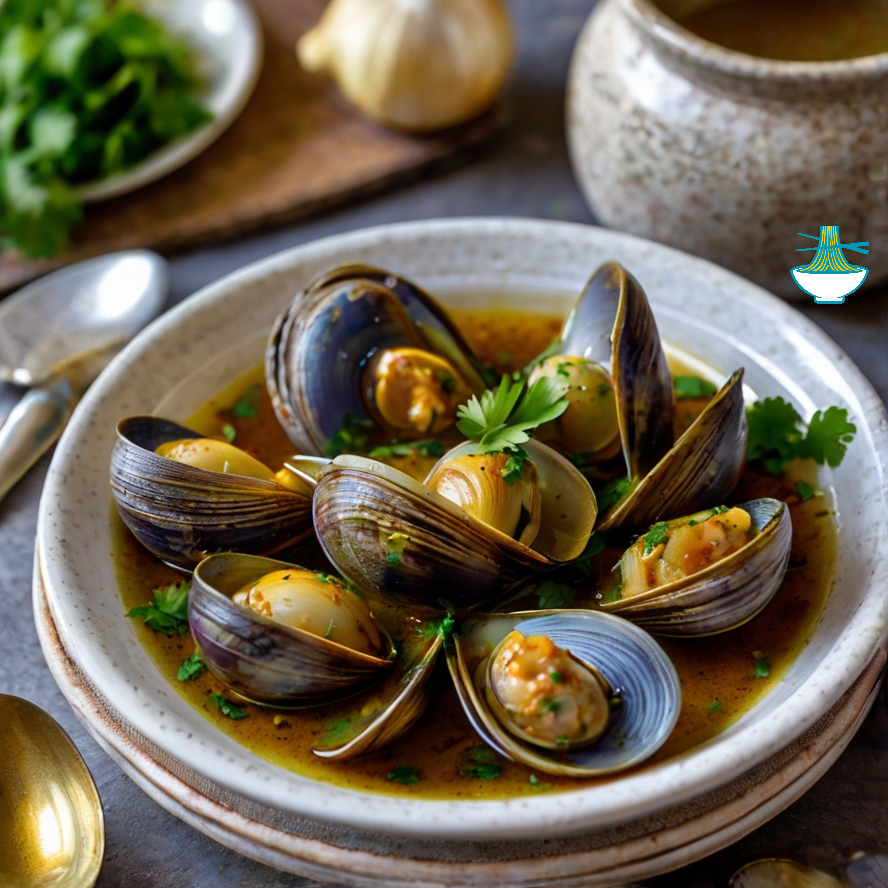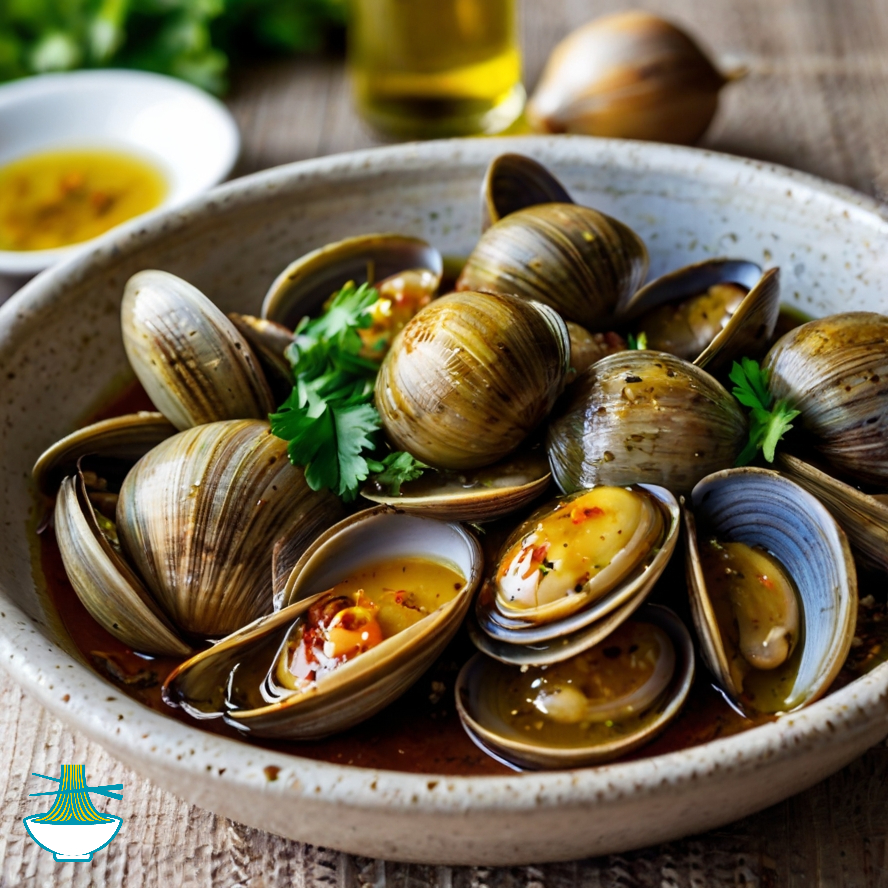Experience the essence of Portugal through Amêijoas àBulhão Pato,a classic dish featuring tender clams cooked in a savory sauce of garlic,olive oil,andcilantro.
Master the art of preparing this iconic Portuguese specialty with our simple recipe.
Ingredients:
- 2 pounds (about 1 kg) fresh clams, cleaned
- 4 cloves of garlic, minced
- 1/4 cup (60ml) extra virgin olive oil
- 1/2 cup (120ml) dry white wine
- 1/4 cup (15g) fresh cilantro, chopped
- Salt, to taste
- Freshly ground black pepper, to taste
- Crushed red pepper flakes (optional)
- Crusty bread, for serving

Instructions:
1-Rinse the clams thoroughly under cold water to remove any sand or debris. Discard any clams with broken shells or that don't close when tapped.
2-In a large skillet or pot, heat the olive oil over medium heat. Add the minced garlic and sauté until fragrant, about 1 minute. Be careful not to let the garlic brown.
3-Increase the heat to medium-high and add the cleaned clams to the skillet. Pour in the white wine and season with salt, black pepper, and crushed red pepper flakes, if using. Give everything a good stir to combine.
4-Cover the skillet with a lid and let the clams cook for 5-7 minutes, or until they have opened. Discard any clams that do not open.
5-Once the clams have opened, remove the skillet from the heat. Sprinkle the chopped cilantro over the clams and toss gently to combine.
6-Taste the sauce and adjust the seasoning if necessary.
7-Serve the Amêijoas à Bulhão Pato hot, directly from the skillet, with plenty of crusty bread to soak up the delicious sauce.
Enjoy your authentic Portuguese culinary experience with this flavorful dish!
Nutritional Values :
Fresh Clams (per 100g):
- Calories: 148 kcal
- Protein: 24 g
- Fat: 3 g
- Carbohydrates: 4 g
- Fiber: 0 g
benefits :
- High Protein: Clams are an excellent source of protein, which is essential for muscle repair and growth.
- Low in Fat: They are low in fat, making them a lean protein choice.
- Rich in Iron and Zinc: Clams are high in iron and zinc, important minerals for immune function and energy production.
- Low in Calories: They are relatively low in calories, making them a nutrient-dense option for those watching their calorie intake.
Garlic (per clove, approximately 3g):
- Calories: 4 kcal
- Protein: 0.2 g
- Fat: 0 g
- Carbohydrates: 1 g
- Fiber: 0.1 g
benefits :
- Antioxidant Properties: Garlic contains compounds with antioxidant properties that may help reduce the risk of chronic diseases.
- Immune Support: It is believed to have immune-boosting properties, helping the body fight off infections.
- Heart Health: Garlic may support heart health by helping to lower blood pressure and cholesterol levels.
- Anti-inflammatory Effects: Some studies suggest that garlic may have anti-inflammatory effects, which could benefit overall health.
Extra Virgin Olive Oil (per 1/4 cup or 60ml):
- Calories: 477 kcal
- Fat: 54 g
- Saturated Fat: 7 g
- Monounsaturated Fat: 38 g
- Polyunsaturated Fat: 5 g
- Cholesterol: 0 mg
- Sodium: 0 mg
- Total Carbohydrates: 0 g
- Dietary Fiber: 0 g
- Sugars: 0 g
- Protein: 0 g
benefits :
- Heart Health: Rich in monounsaturated fats, olive oil is known to promote heart health by improving cholesterol levels and reducing the risk of cardiovascular disease.
- Antioxidants: Extra virgin olive oil contains powerful antioxidants, such as vitamin E and phenolic compounds, which help protect cells from damage caused by free radicals.
- Anti-inflammatory: Olive oil has anti-inflammatory properties that may help reduce the risk of chronic diseases like arthritis and cancer.
- Skin Health: Consuming olive oil may contribute to healthy skin, thanks to its moisturizing and anti-aging effects.
Dry White Wine (per 1/2 cup or 120ml):
- Calories: 121 kcal
- Carbohydrates: 4 g
- Sugars: 1.2 g
- Protein: 0.2 g
benefits :
- Resveratrol: White wine contains resveratrol, a polyphenol with antioxidant properties that may offer various health benefits, including protecting against heart disease and promoting longevity.
- Cardiovascular Health: Moderate consumption of wine has been associated with a reduced risk of heart disease and stroke.
- Relaxation: Enjoying wine in moderation can promote relaxation and socialization, contributing to overall well-being.
Fresh Cilantro (per 1/4 cup chopped or 15g):
- Calories: 1 kcal
- Protein: 0.1 g
- Fat: 0 g
- Carbohydrates: 0.2 g
- Fiber: 0.1 g
benefits :
- Rich in Antioxidants: Cilantro contains antioxidants that help neutralize free radicals and reduce oxidative stress in the body.
- Anti-inflammatory: Some studies suggest that cilantro may have anti-inflammatory properties, which could benefit conditions like arthritis and inflammatory bowel disease.
- Digestive Health: Cilantro contains fiber and compounds that may support digestive health by promoting regularity and preventing constipation.
- Nutrient Dense: Cilantro is rich in vitamins A, C, and K, as well as minerals like potassium and manganese, contributing to overall health and well-being.
Please note that these values are approximate and can vary based on factors such as the specific brands of ingredients used and variations in serving sizes.


Comments